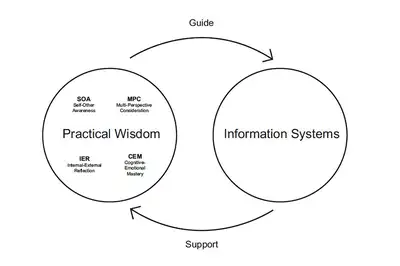
Practical wisdom has a critical role to play in the field of information systems.
The world is facing numerous problems that continue to grow in scale and complexity. Technologies offer the promise to address and resolve many issues, but they also threaten our jobs, security, privacy, relationships, our sense of self, and going deeper, human survival itself. Eminent scientists and technologists, such as the late Stephen Hawking, Bill Gates, and Elon Musk have raised serious concerns about technical "progress" and potential looming disasters. So, can we have both technical and social progress?
Given the perils and promise of increasingly powerful information technologies, practical wisdom has a critical role to play in the field of information systems (IS). To conceptualise how, we have developed a framework called the Wisdom-IS nexus, where practical wisdom guides information systems and information systems support practical wisdom. In this framework, there are four dimensions of practical wisdom, which were developed by Massey Business School senior lecturer Dr Ali Intezari for his PhD thesis:
- Multi-perspective consideration considers and reconciles multiple points of view of individuals and groups, incorporating ethical perspectives, and anticipating short- and long-term consequences.
- Cognitive-emotional mastery integrates two components: cognitive mastery and emotional mastery. Cognitive mastery includes the ability to apply knowledge, expertise, and experience, whereas emotional mastery is about emotional regulation, empathy, and courage.
- Self-other awareness includes mindful awareness of the self in relationship to others, which may be other individuals as well as the environment. It also includes awareness of strengths, weaknesses, and other behavioural characteristics in yourself and others.
- Internal-external reflection includes learning from your own and others' experiences, including mistakes.

The Wisdom-IS nexus, a framework where practical wisdom guides information systems and information systems support practical wisdom.
Wisdom as a multidimensional lens
Collectively, these dimensions encompass a view of practical wisdom that is both personal and holistic by including such individual characteristics as awareness, cognition, emotions, and reflection, along with the perspectives of other people and the wider community. The four dimensions provide a multidimensional lens to guide, understand, inform, and extend IS development and use.
IS development covers a wide range of processes, from systems analysis and design to systems construction and installation, project management and configuration of software packages and implementation. IS use includes the use, management and impact of information technologies (such as technology acceptance), as well as the analysis of usage data and information. For example, self-awareness is crucial to how an individual relates to using modern technologies, while multi-perspective consideration and internal-external reflection are critical for a systems analyst to determine requirements for an IS development project.
The other half of the relationship is about developing and using IS to support practical wisdom. Support would include activities to discover, create, share, accumulate, foster, and manage the specific dimensions of wisdom. An example of this could be the development of a decision support system that supports multi-perspective consideration and internal-external reflection. When we put both halves of the relationship together, we have a synergistic loop: practical wisdom can help guide IS development and use, and wise IS can support practical wisdom to help make us wiser.
Designing a digital future for the common good
The framework allows us to tackle significant questions, including mindful use of technologies, creating wisdom networks and digital spaces for dialogue, extending the area of knowledge management and fostering wisdom-based organisations, "green IS", developing measures of wisdom using data and information, understanding the relationships between society and technology, and teaching and communicating wisdom in the IS field.
Humankind is looking for ways to shape and redesign the digital future for the common good and to address seemingly intractable and wicked problems posed by ever-powerful technologies. Einstein is believed to have said: "No problem can be solved from the same level of consciousness that created it." To find answers, we have to go right down to the foundations.
Wisdom, whose goal is the common good, can provide a strong foundation to discover, view, understand, and resolve myriad issues that lie at the intersection of wisdom and information technologies. Our framework suggests one way the IS field can extend its focus beyond data, information, and knowledge is to include wisdom.
Wise IS is not just an academic or practitioner issue. Ultimately, an explicit focus on wisdom in IS (or in any other area) may help us be wiser ourselves. It can help us to better understand our differences and philosophical positions and intelligently approach the disputes and controversies we see in many disciplines. Indeed, wisdom (like maturity) is a self-demanding capacity. We need to cultivate wisdom to better understand, empathise, and deepen the many perspectives that exist in IS and related fields. The manner and the depth from which we respond to the challenges are as important as the content of our responses.
David Pauleen is a Professor of Technology Management in the School of Management at Massey University.
Nikunj Dalal is a Professor in the Department of Management Science and Information Systems in the Spears School of Business at Oklahoma State University.